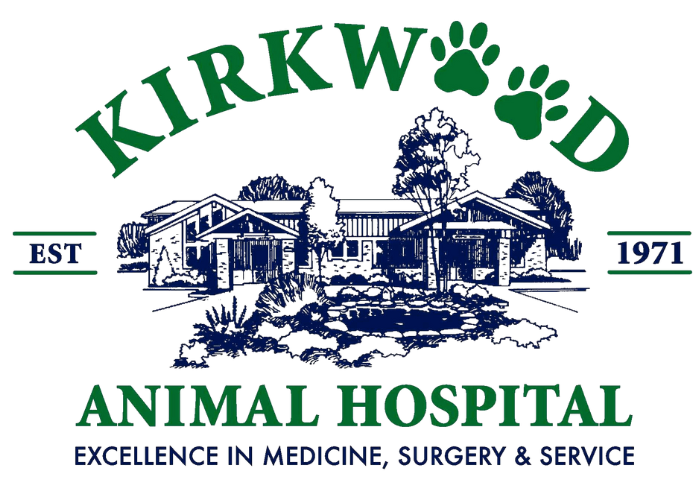Selecting a Puppy
When you are looking for a New Puppy… We’re on Your Side
The purchase of a puppy is one of the most important decisions your family will make. There are a number of factors that should be weighed before making a final decision on your new family member. The veterinarians at Kirkwood Animal Hospital will be your advocates.
We feel that we have a professional obligation to inform you, “the potential owner,” of as many of the risks and complications that we can find in the new puppy. We do not have a business relationship with breeders of dogs and, therefore, can maintain complete objectivity. When you depart to visit a new puppy, remember these important points:
Pure or Mixed breed?
Purebred pets have specific breed characteristics in attitude and personalities as well as looks and colors. Be sure and do your homework. However, be warned breeders and breed enthusiasts write the books and articles you might find on your potential pet. In most cases, you will find that your potential new pet will be perfect, and you may feel that they can clean the house and wash the dishes to boot! They also may have health problems that are associated with their breed. We can help you to understand these.
Mixed breed pets or crossbred pets have hybrid vigor. The crossing of two or more purebreds can lead to pets that are healthier than either of their parents. There are thousands of great mixes or cross-bred pets that need homes and make great pets for life. However, you may not be able to count on the good as well as the bad traits coming through on the cross.
Would I live here?
Look around at the environment where your potential new puppy lives. Some breeders encourage new pet owners to meet the puppies at a third-party location. However, it is important for you to view the breeding facilities. If the kennel you are visiting is dirty, smells bad, or appears disorganized, do not purchase the pet! A dirty environment equals a dirty pet, which can lead to parasite problems, viral infections, and a sick puppy.
If you think breeding is in your pet’s future, beware.
Does the breeder have the litter registration papers?
Is it registered by a known association, e.g., AKC – American Kennel Club?
Many breeders are now controlling the breeding rights of the puppies they sell. In other words, they require that you sign papers stating that you will not breed the dog at all or without permission.
Payment method?
Will they take a check for payment? Never pay cash! When you write a check for payment, you have the option to stop payment on the check. If there is a major health problem with the puppy, you have recourse.
What age is best to bring a new pet home?
It is always best to get a new pet between the ages of 6 to 9 weeks. If properly raised, the pup should be weaned and eating on its own. At age 6-12 weeks, puppies are forming social bonds that will last their lifetime. If they are with people, they will bond with people. If they are raised in a kennel with other dogs, they will always be closer to their own species.
Have they been socialized?
It is best to purchase pets that have been handled a lot by people, especially children.
When should I bring my new puppy to the vet?
We recommend your new pet be examined by a veterinarian within 24-48 hours.
Who should I have performed the exam?
Many breeders have a business relationship with a vet. The breeder usually receives services at a much-reduced cost from the veterinarian in exchange for the referral of the puppy to the Veterinary clinic. You will have to decide if this type of relationship can allow these hospitals to be objective in their assessment of the pet. Are they likely to be an advocate of the breeder? We recommend that you insist on an exam by one of our veterinarians at Kirkwood Animal Hospital.
What about hip dysplasia and other genetic diseases?
The pet you buy will hopefully be a valued member of your family for many years to come. It is worth spending some time investigating what diseases are common to that breed or hybrid pet. These diseases can affect your pet’s quality as well as the length of life. Becoming familiar with these conditions prior to making your purchase can save you a lot of heartbreak in the years to come.
Hip Dysplasia is probably the most commonly known hereditary disease known to affect dogs. However, there are many other known diseases that are genetic and, as a result, are common in specific breeds.
We recommend that if you are purchasing any purebred or hybrid dog, you require both the mother and the father to be certified free of Hip and Elbow dysplasia as well as other diseases common to that breed. An excellent summary of some of the most common and serious of these diseases is available at the Orthopedic Foundation for Animals (OFA) and the Guide to Hereditary and Congenital Diseases in Dogs by W. Jean Dodds DVM.
Call before you leap:
Call Kirkwood Animal Hospital before you go. Our staff may have already encountered a puppy or kitten from the litter you will be visiting. We also have information on specific breeds of dogs and how that breed may fit in with your family.
A new pet will become a valued member of your family for the next ten to fifteen years. It is important to do your homework and invest the time and effort to get the best pet you can for your family. Remember to be discerning. We have found that most puppies and kittens are purchased on impulse, and the new owners are attached by the time they leave the breeders. Over the last 48 years, we have had to send back many puppies, and kittens-buyer beware. Try to be objective until your pet is examined by one of our doctors.
Good luck. We are always here to help you.


